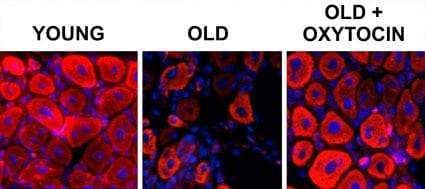
‘Love hormone’ gives greater sense of spirituality than a placebo
Oxytocin has been dubbed the “love hormone” for its role promoting social bonding, altruism and more. Now new research from Duke University suggests the hormone may also support spirituality.
In the study, men reported a greater sense of spirituality shortly after taking oxytocin and a week later. Participants who took oxytocin also experienced more positive emotions during meditation, said lead author Patty Van Cappellen, a social psychologist at Duke.
“Spirituality and meditation have each been linked to health and well-being in previous research,” Van Cappellen said. “We were interested in understanding biological factors that may enhance those spiritual experiences.
“Oxytocin appears to be part of the way our bodies support spiritual beliefs.”
Study participants were all male, and the findings apply only to men, said Van Cappellen, associate director of the Interdisciplinary and Behavioral Research Center at Duke’s Social Science Research Institute. In general, oxytocin operates somewhat differently in men and women, Van Cappellen added. Oxytocin’s effects on women’s spirituality still needs to be investigated.
The results appears online in the journal Social Cognitive and Affective Neuroscience.
Oxytocin occurs naturally in the body. Produced by the hypothalamus, it acts as a hormone and as a neurotransmitter, affecting many regions of the brain. It is stimulated during sex, childbirth and breastfeeding. Recent research has highlighted oxytocin’s possible role in promoting empathy, trust, social bonding and altruism.
To test how oxytocin might influence spirituality, researchers administered the hormone to one group and a placebo to another. Those who received oxytocin were more likely to say afterwards that spirituality was important in their lives and that life has meaning and purpose. This was true after taking into account whether the participant reported belonging to an organized religion or not.
Participants who received oxytocin were also more inclined to view themselves as interconnected with other people and living things, giving higher ratings to statements such as “All life is interconnected” and “There is a higher plane of consciousness or spirituality that binds all people.”
Study subjects also participated in a guided meditation. Those who received oxytocin reported experiencing more positive emotions during meditation, including awe, gratitude, hope, inspiration, interest, love and serenity.
Oxytocin did not affect all participants equally, though. Its effect on spirituality was stronger among people with a particular variant of the CD38 gene, a gene that regulates the release of oxytocin from hypothalamic neurons in the brain.
Van Cappellen cautioned that the findings should not be over-generalized. First of all, there are many definitions of spirituality, she noted.
“Spirituality is complex and affected by many factors,” Van Cappellen said. “However, oxytocin does seem to affect how we perceive the world and what we believe.”
Learn more: OXYTOCIN ENHANCES SPIRITUALITY, NEW STUDY SAYS
The Latest on: Oxytocin
[google_news title=”” keyword=”Oxytocin” num_posts=”10″ blurb_length=”0″ show_thumb=”left”]
via Google News
The Latest on: Oxytocin
- For these singers, it's a form of therapy. This is how choirs can help our brains and bodies recover from burnouton April 27, 2024 at 12:15 pm
Scientists have been singing the praises of community choirs for decades, and they're only just scratching the surface on all of the benefits for cognitive, social and emotional wellbeing. So what is ...
- 17 May Birth Flower Tattoos to Celebrate Your Birthdayon April 26, 2024 at 10:45 pm
These May birth flower tattoos will help you celebrate your birthday in style. See examples of unique, minimalist, and colorful tattoo designs.
- 'Aftercare' Is The BDSM Practice We Should Use For Vanilla Sex, Tooon April 26, 2024 at 7:15 pm
In the world of BDSM, aftercare is a post-play ritual in which partners exchange physical or emotional comfort following an intense sexual experience. And it’s high time we make it a standard part of ...
- We’re All Reading Wrongon April 26, 2024 at 6:39 pm
Until approximately the tenth century, when the practice of silent reading expanded thanks to the invention of punctuation, reading was synonymous with reading aloud. Silent reading was terribly ...
- Microwave Wear Their Influences Proudly On ‘LSD’on April 26, 2024 at 8:47 am
I’ll call Microwave ’s fourth album by its actual name just once and honor frontman Nathan Hardy’s desire to have everyone else just use the acronym going forward. “We just love drugs,” he deadpans ...
- How Do I Know If My Dog Is Happy? 12 Signs of a Happy Dogon April 25, 2024 at 1:32 pm
Of course, we want our pups to be happy from head to tail, but what does happiness look like in dogs? Dog behavior is complex, so it can be hard to tell how our pups feel, whether happy, unhappy or ...
- 45 vintage photos that will make you laughon April 25, 2024 at 8:51 am
Laughter is a universal language. From stylish dogs to famous people joking around, these vintage photos will make you smile.
- Mapping the Neural Circuit of Social Avoidanceon April 25, 2024 at 7:51 am
Moving forward, Lin plans to continue studying this circuit to uncover other neuronal populations and brain regions that may contribute to social avoidance learning. She also wants to examine this ...
- Ypsilanti elementary schoolers asked for a puppy, and the district said yeson April 25, 2024 at 2:49 am
Brick Elementary School will get its very own therapy dog after the school board unanimously approved the program.
via Bing News










